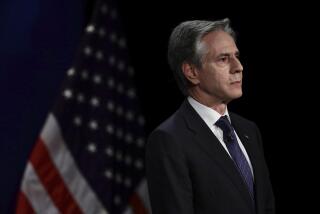Soviets Taking Food Stocks, Georgia Says : Breakaway republics: President charges reserves are being seized as part of a massive campaign of economic sanctions.
MOSCOW — Soviet troops have started gathering up food and other goods stored in warehouses in the rebellious southern Soviet republic of Georgia as part of a massive campaign of economic sanctions in reprisal for its declaration of independence, Georgia’s president charged on Wednesday.
Georgian President Zviad Gamsakhurdia said in an interview that Prime Minister Valentin S. Pavlov “ordered interior troops to take by force all the food reserves from Georgia.”
“I demand that they recognize the independence of Georgia,” Gamsakhurdia continued. “Soviet officials say they are trying to do the best for Georgia. But it is only words--they act on the contrary. They have made a terrible economic blockade.”
The Interior Ministry troops apparently were instructed to take the food reserves, which are part of state stocks, out of Georgia and give them to more submissive republics. The campaign was only in its first day, so it was impossible to judge how widespread the emptying of warehouses would be.
A Soviet official close to President Mikhail S. Gorbachev said he had no direct information about the troops’ order for a broad economic blockade against Georgia, but he did not rule it out either.
“It’s likely that this would happen because of the republic’s declaration of independence. Similar things happened after Lithuania declared independence,” said the official, who spoke on condition of anonymity. “But it’s hard to say. Sometimes this guy Gamsakhurdia exaggerates.”
Gamsakhurdia, 52, a fiery dissident-turned-president, said the actions by troops is just part of the Kremlin’s punishment for Georgia’s unwillingness to remain part of the Soviet Union.
The republic’s energy supply--electricity, oil and gas--has been drastically reduced, Gamsakhurdia said, and Soviet officials prevent goods from entering Georgia from other Soviet republics.
“At the northern border between Georgia and the Soviet Union, they stop trucks and confiscate everything inside,” Gamsakhurdia continued. “Sometimes, they confiscate ships on the Black Sea, too. This is direct state banditry.”
Gamsakhurdia said he wrote Gorbachev last month complaining about the problems.
“This is infringement against the sovereign republic of Georgia and its constitutional rights,” Gamsakhurdia wrote, “and it is obviously sanctioned by the center.”
He also accused Moscow of refusing to supply vehicles to transport medicine and medical equipment that Western countries had donated to help victims of the April earthquake in northern Georgia. The quake killed 144 people and destroyed tens of thousands of homes and other buildings.
“Gorbachev called me twice about the earthquake to ask, ‘How can I help you?’ ” Gamsakhurdia said.
But the offer was not genuine, he said, contending that instead of providing assistance, Moscow stepped up its economic sanctions.
“We are in great need because of this earthquake, but instead of helping us, what do they do?” Gamsakhurdia asked with irony. “This is the new, human Soviet Union.”
The economic sanctions, Gamsakhurdia said, are the Kremlin’s way of imposing the negative aspects of independence on Georgia before granting the wayward republic real independence.
In late March, Georgians voted almost unanimously for independence from the Soviet Union, and a week later their Parliament declared independence. But Moscow has not accepted the declaration, and Soviet troops still guard Georgia and its border with Turkey.
Georgia is among the six Soviet constituent republics that have refused to participate in Gorbachev’s new Union Treaty, which would govern a new type of federation.
More to Read
Sign up for Essential California
The most important California stories and recommendations in your inbox every morning.
You may occasionally receive promotional content from the Los Angeles Times.










